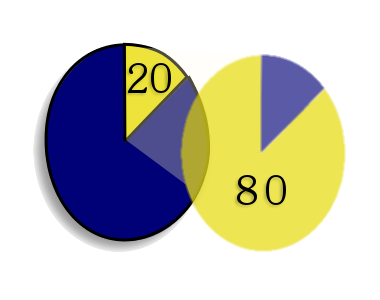The 80-20 rule for self-promotion on line
It took me three years to finish a manuscript for a YA novel. With 150 thousand words, an agent told me it was too long and suggested some serious editing. I decided to break the story into smaller installments and am working on them. While doing it I started researching the fantastic World Wide Web and the ever so challenging publishing market; and stumbled on a surprising rule, actually the Pareto Principal usually called the 80-20 rule applied to self-promotion, that states writers should spend 20% of their time writing and 80% of it working the web. And even though I find it interesting, I can’t do it. If I sit down to write, the first thing I need to do is work on my manuscript.
I would love to be able to tweet a few times a day, and even be on facebook – where all my followers are personal friends, more often, and try to make my numbers grow. But I have recurrent dreams where my characters are frozen mid-action with their eyes moving around as if looking for me. When I leave them sitting down or resting it’s all right, but usually I leave them in trouble and feel quite anxious to get them out of harm’s way.
So, after going about my daily chores, as I finally sit down in front of my keyboard, I write. If I have any extra free time when I finish, I go on twitter and/or facebook. I also like to read daily, newspapers and magazines, on line or on print. Gosh, I still have subscriptions on print. I always have at least one book I’m half way through, and one I just begun. And I try to post on my two blogs weekly. I’m not an author, yet. I’m a writer, and feel absolutely blessed for the time I write. For me writing isn’t only gratifying, it’s essential.
Imagine my consternation every time I read a comment from a social media expert on the importance of on line self-promotion for a writer’s career. Luckily I came upon an excellent article from Ewan Morrison – Why social media isn’t the magic bullet for self e-published authors where he says:
“The bad news for social media companies is that after all the hype and the projections, there are stats: there is evidence, there are consequences, and heads will roll. In publishing terms it has recently been revealed that 10% of all self e-publishers make 75% of all the money; that 50% of self-published eBooks make less than $500 a year (£320, or 87p a day); and that 25% doesn’t cover the costs of production. Broadly, what this means is that if you went out on the street with a book in your hand and tried to sell it to a stranger for 88p, or 99p, and you did this every day, you would still be making more money than 50% of all self-published authors on Amazon and all the other new e-pub platforms.”
“It also turns out that the eBook market now looks a lot like the old mainstream model. A small number of writers make a lot and everyone else wallows in the doldrums of minuscule sales. The only difference is that those at the top are selling 100,000 copies at 99p, not at £4.99, or £8.99 – which in real terms represents a massive shrinkage of the market. Furthermore, it signifies the passage of the publishing industry into the hands of the Internet companies that can capitalize on a million small sales by a million small authors.”
 I’m a creature of habits, and the routine keeps me productive and inspired. I spend roughly 80% of my working time writing and 20% on line. And when I say on line, I’m talking mostly about my blog, which I also consider writing. Apparently I might not be a good candidate for self-pub. Then again, as these rules change all the time, who knows. For now I’m writing contentedly, and am preparing to start querying. Besides, it seems to me that taking the time to craft a great manuscript is the key. So let’s have fun while at it. After all, as Ralph Waldo Emerson said, “Life is a journey, not a destination.”
I’m a creature of habits, and the routine keeps me productive and inspired. I spend roughly 80% of my working time writing and 20% on line. And when I say on line, I’m talking mostly about my blog, which I also consider writing. Apparently I might not be a good candidate for self-pub. Then again, as these rules change all the time, who knows. For now I’m writing contentedly, and am preparing to start querying. Besides, it seems to me that taking the time to craft a great manuscript is the key. So let’s have fun while at it. After all, as Ralph Waldo Emerson said, “Life is a journey, not a destination.”
